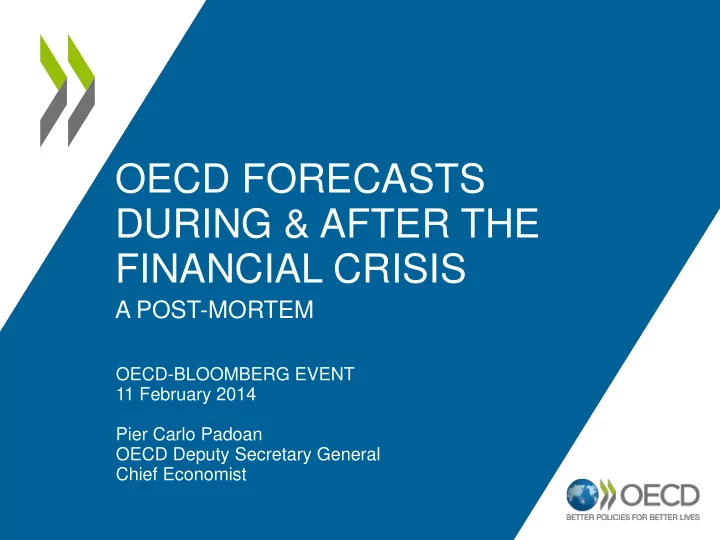

OECD FORECASTS DURING & AFTER THE FINANCIAL CRISIS A POST-MORTEM OECD-BLOOMBERG EVENT 11 February 2014 Pier Carlo Padoan OECD Deputy Secretary General Chief Economist
The crisis and the recovery have been exceptional 2
Forecasts missed the downturn…. % Forecasts of GDP growth in 2008 Forecasts of GDP growth in 2009 % 3 3 2 2 1 1 0 0 -1 -1 -2 -2 -3 -3 Outturn May-07 Nov-07 May-08 Nov-08 Outturn May- May-08 Nov-08 May-09 Nov-09 May- Successive forecasts of Q4-on-Q4 OECD GDP growth 3
…and accuracy was mixed during the recovery 4 Successive forecasts of Q4-on-Q4 OECD GDP growth
Forecast errors in the crisis were comparable to the first oil shock in the 1970s 5
UK forecast errors are similar to those of other G7 economies Error in GDP growth forecast 6
Forecast errors were largest in the vulnerable euro area countries 7
What can explain the forecast errors? Could they have been avoided? Two approaches: 1. Comparing errors with data available at the time These data could have helped to reduce our forecast errors 2. Comparing errors with data available now (not available at the time) These data help identify the “shocks” 8
The downturn was deeper than projected in more open economies Cumulative errors in May 2008 forecasts for GDP growth in 2008-09 0 0 Forecast error (%pt) Forecast error (%pt) -4 -4 -8 -8 -12 -12 -16 -16 0 100 200 0 50 100 Trade openness Foreign banks' assets (% total) 9
Forecasts were too optimistic for countries with lower pre-crisis bank capital Growth forecast errors for 2010-11, from May 2010 8 4 Forecast error (%pt) 0 -4 -8 8 12 16 20 Bank regulatory capital in 2007 (%) 10
Growth forecasts were less accurate in more heavily regulated economies Indicators are the OECD product market regulation index and the OECD 11 measure of the strictness of employment protection (for regular workers)
Were we too optimistic about the negative impact of fiscal consolidation? 12
The intensification of the euro area crisis was a more important source of growth forecast errors 13
OECD New Approaches to Economic Challenges “By seeking and blundering, we learn.” Goethe 14
Lesson 1 – get better at spotting downturns Directional accuracy of May growth projections OECD countries: 2007-12 Accelerations Decelerations Number in period 56 116 % correct: projections for same year 86 88 % correct: projections for next year 91 46 G7 countries: 1982-2006 Accelerations Decelerations Number in period 82 78 % correct: projections for same year 79 83 % correct: projections for next year 74 45 15
Lesson 2 – include more information on the financial system 16
Lesson 3 – avoid “groupthink” Average errors in forecasts from May - G7 countries %pt From one year ahead From the same year %pt 4 4 2 2 0 0 -2 -2 OECD IMF -4 -4 Consensus EC -6 -6 2007 2008 2009 2010 2011 2012 2007 2008 2009 2010 2011 2012 17
Lesson 4 – better recognise global linkages and spillovers Financial openness is the sum of foreign assets and liabilities as a percentage of double GDP. 18
Lesson 5 – think more about risks • More information about the risks around the main projections. • Greater use of quantitative scenario analysis to illustrate possible outcomes. • Horizon scanning to plan ahead for unlikely but potentially costly events. 19
Summary • Forecasting in recent years proved very challenging and growth has been repeatedly over-estimated. • We can learn from our errors to focus more on global linkages, the financial system and risks. • There are limits to what forecasts can achieve. Accordingly, as much attention should be paid to the balance of risks as to point forecasts. “OECD forecasts during and after the financial crisis: a post m ortem ” OECD Economics Department Policy Notes No. 23 20
Recommend
More recommend